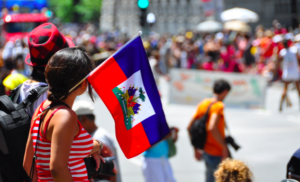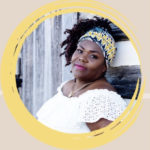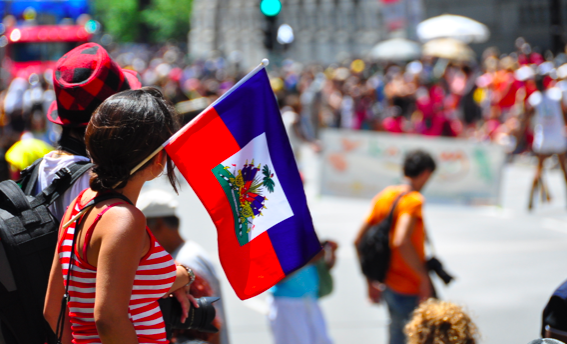 Your name sets you apart and when you grow up with a name like “Francemise St. Pierre,” it is extremely obvious that you are either a foreigner or that your parents like exotic names. I, however, didn’t fit any of those categories. I am a second-generation immigrant woman born of Haitian descent. This means that I was born here in the United States to Haitian immigrants. My father tells me that he got my first name from a dream and decided that this was to be my name. Unfortunately, I don’t know what my name means and I can never find my name on cute keychains or cups. I digress…
Your name sets you apart and when you grow up with a name like “Francemise St. Pierre,” it is extremely obvious that you are either a foreigner or that your parents like exotic names. I, however, didn’t fit any of those categories. I am a second-generation immigrant woman born of Haitian descent. This means that I was born here in the United States to Haitian immigrants. My father tells me that he got my first name from a dream and decided that this was to be my name. Unfortunately, I don’t know what my name means and I can never find my name on cute keychains or cups. I digress…
I have had the privilege of growing up in two cultures—Haitian and American. This made for an interesting dichotomy especially because for most of my life, I wanted to fit in. At home, we spoke mostly Haitian Creole and as my siblings and I grew older, we introduced “Crenglish” to my parents–our blend of Creole and English. As a matter of fact, I remember the day I realized that I was an English Language Learner in a graduate class when I studied the plight of students who learned English as a second language. My parents taught me Creole first with the mindset that we would learn English in school. While I didn’t need English as a Second Language or English Language support in school, it enabled me to be compassionate and an advocate later on in life to my students from other countries.
Much of my childhood was centered around church. My parents believed in the importance of leading a Christian life so when we weren’t in school or spending time with family, we could be found at church. This is important because it was there that I was introduced to the French language because not only were services held in Creole, but they were also conducted in English and French as well. I learned to sing songs and memorized scriptures in all three languages, and eventually, I taught myself to read the Bible in French as well. This is where my literacy and fluency in French was born. If it had not been for Haitian Creole, I don’t think I would have had the foundation and success I had in studying French in high school and college like I did. My parents were very hard-working, blue-collar workers. My mom did not have the luxury of staying at home to rear us, so they had to make the very hard decision to send my older brother and I to Haiti when I was a baby/toddler. I stayed in Haiti for about six months but when my mom came to visit us, I refused to leave her side and she had no choice but to take me back to the U.S. with her. The sad thing is that I haven’t been back to Haiti since.
As I reflect on what it means to be the daughter of Haitian immigrants, I am most proud of our history of activism and protest. Although much of my identity has been shaped by the origin of my parents’ birthplace, there was a slight bifurcation in my upbringing. I wasn’t only Haitian; I was a Haitian Christian. This meant that my life was a bit sheltered and that I was never fully able to embrace all of my heritage. Because we were “saved”—accepted Jesus as our Lord and personal Savior, my parents kept us away from things like “Carnival” and anything they felt was related to Voodoo and any associated stigma. In addition, my parents didn’t share much about their past because some of their stories were painful and they probably feared being misunderstood. Like other immigrants, they wanted to live peaceably and to provide a good life for us that didn’t include the hardships and disrespect they faced at the hands of other people because of the way they looked, acted, and spoke.
I remember the day that my parents joined over 50,000 fellow Haitians from New York and New Jersey to protest “a Federal health policy on blood donations that unfairly demonized Haitians and Africans.” Haitians were so outraged that they rallied and literally shut the Brooklyn Bridge down as well as the streets of Brooklyn and made a significant political statement that resulted in the reversal of the policy. When my mom returned from the march, she told me that there were so many people walking over the bridge that it literally shook. As I prepared to write this paper, my mom shared how active my father was in other protests like the one in support of President Jean-Bertrand Aristide in 1997. The police underestimated “The demonstration [which] had been announced days before, … even though the 300,000 members of the Haitian community in New York have shown a readiness to voice their political concerns.” My people know how to take collective action and be heard!
I am proud to be a daughter of Haitian immigrants. We are a people who have a history of advocacy and activism. No wonder, I cannot stand silently on the side of injustice.
 Dr. Francemise Kingsberry is a motivational speaker and blogger who inspires others to find beauty in their own stories. She is also a mom, educator, and advocate.
Dr. Francemise Kingsberry is a motivational speaker and blogger who inspires others to find beauty in their own stories. She is also a mom, educator, and advocate.

There are no comments
Add yours